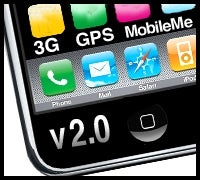 |
NEW YORK — The new iPhone is expected to attract hordes of buyers when it goes on sale on Friday in more than 20 countries, helping Apple (NASDAQ: AAPL) handily beat its target to sell 10 million of them by the end of 2008.
The much-anticipated smartphone has faster Web links than the first iPhone, supports third-party software like games and is being heavily subsidized by many phone carriers, with some even giving it away to attract new subscribers.
Atlantic Equities analyst James Cordwell said Apple may sell more than a million new iPhones in the first weekend, partly because it is selling in so many more countries than the first one, which was only available in six.
Some 270,000 people bought the first iPhone in the few days after its launch in late June 2007, after many U.S. customers had lined up for days outside its stores. AT&T (NYSE: T), the sole U.S. carrier, will shoulder much of the cost for the latest phone to halve the price.
“They’re going to bring users in droves to this product,” Deutsche Bank (NYSE: DB) analyst Chris Whitmore said. He sees Apple burying its own 10 million sales target by selling about 10.5 million of the new high-speed iPhones this year, having already sold more than 6 million of the first one to date.
Whitmore said price and distribution were two key reasons why the new device, which plays music and supports corporate e-mails, would outsell its predecessor.
New markets
While some analysts expect the new phone to sell best in the United States and Western Europe, consumer excitement in new markets such as Hong Kong, Japan and New Zealand appeared to foretell strong demand in other markets too.
“The key is less likely to be demand and more likely to be supply,” said Atlantic Equities’ Cordwell.
In Hong Kong, Hutchison Telecommunications (NYSE: HTX) was flooded with 60,000 online applications over the weekend from consumers hoping to buy the 500 phones on sale there.
In New Zealand, which will be the first country to sell the phone due to its time zone, people started lining up outside a Vodafone (NYSE: VOD) store on Tuesday, according to a local paper.
02, the U.K. arm of Telefonica (NYSE: TEF), said its Web site was overwhelmed with early orders on Monday after being hit with 13,000 orders per second during the peak, according to a spokesman who said it had sold out in a few hours.
The carrier, which is giving the phone away to customers who commit to specific data service packages, said it has stock left to sell in stores Friday and expects more deliveries.
Carphone Warehouse, a U.K. phone retailer, said interest for the latest iPhone is 10 times higher than for the first device. Neither company gave specific sales figures.
T-Mobile, owned by Deutsche Telekom (NYSE: DT), said it has received orders for several thousand iPhones in Germany alone, where the cheapest iPhone will sell for 1 euro. It also plans to offer it in the Netherlands and Austria starting on Friday.
Pent-up demand
Investors will be particularly interested in demand in Japan, where consumers have a strong penchant for advanced mobile devices. Some see the plan by Japan’s No. 3 mobile service provider, Softbank, to sell the iPhone as a big threat to market leader NTT DoCoMo (NYSE: DCM) as Apple fans were already lining up in Tokyo two days before launch.
But many analysts are skeptical that the device will be popular among mainstream customers, as it does not support television services or electronic-payment features widely used in Japan.
However, Mitsubishi UFJ Securities analyst Shinji Moriyuki said Softbank stores were getting 50 to 100 inquiries a day per store about iPhones, compared with up to 30 a day before the launch of DoCoMo’s popular 906i device series.
Research firm Enterbrain said 6.7 percent of 1,200 people it surveyed in Japan wanted to buy an iPhone immediately, while 35.7 percent were interested but undecided.
Even in mainland China, where Apple has announced no carrier deals or official plans to sell the phone, retailers were gearing up to sell gray-market iPhones.
Many carriers are making buyers of subsidized iPhones commit to contracts they cannot break without a penalty, to discourage them from unlocking the phone to work on other networks.
But a merchant on the third floor of the Cybermart mall on Shanghai’s posh Huaihai Road said hacking would still happen.
[cob:Special_Report]”As soon as we get it from Hong Kong and bring it over and unlock it, you should be able to buy it here by the end of July at the latest,” said the vendor, whose surname was Zhang. “The Chinese are very quick at unlocking iPhones.”
Apple still gets paid for hacked phones. Whitmore estimated iPhone gross profit margins at more than 50 percent, versus his estimate for iPod margins in the low 30 percent range.
“To the extent it cannibalizes iPod, it’s better economically for Apple,” he said.


